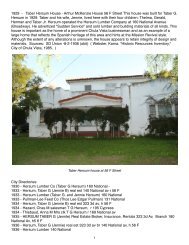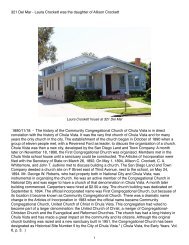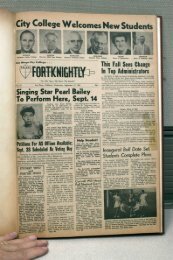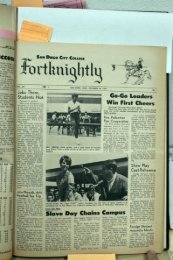doc241 - Schoenherr Home Page in Sunny Chula Vista
doc241 - Schoenherr Home Page in Sunny Chula Vista
doc241 - Schoenherr Home Page in Sunny Chula Vista
Create successful ePaper yourself
Turn your PDF publications into a flip-book with our unique Google optimized e-Paper software.
next morn<strong>in</strong>g, she saw the body hang<strong>in</strong>g <strong>in</strong> the Haraszthy house, mistook it for an effigy<br />
and called to her husband that the Spanish had been "hang<strong>in</strong>g Judas" aga<strong>in</strong>.<br />
Mrs. Carson tells many <strong>in</strong>terest<strong>in</strong>g stories about the Indians of San Diego <strong>in</strong> early<br />
days. They kept an Indian servant who one day was miss<strong>in</strong>g, and after two days was<br />
found <strong>in</strong> the bottom of a dry well. He was taken out, very much bruised, his wounds<br />
dressed, and an Indian employed to nurse him. He improved and was thought to be out<br />
of danger; but one day the nurse went away and left a bl<strong>in</strong>d Indian <strong>in</strong> charge of the patient,<br />
who thereupon crawled out of bed and proceeded to treat himself by the Indian<br />
method. This consisted of tak<strong>in</strong>g a brand from the fireplace and scorch<strong>in</strong>g himself on the<br />
side with it, to set up a counter irritation by burn<strong>in</strong>g. He burned himself so severely that<br />
he only lived a few hours afterward.<br />
Thomas Whaley bought an Indian girl from her parents, giv<strong>in</strong>g them someth<strong>in</strong>g<br />
like $100 worth of goods from his store <strong>in</strong><br />
<strong>Page</strong> 196<br />
[Robert D. Israel]<br />
exchange for their consent for the girl to live <strong>in</strong> his family. The girl stayed about a month<br />
and then disappeared and returned to her parents. When Mr. Whaley went after her<br />
they were will<strong>in</strong>g to let her go, but wanted to be paid over aga<strong>in</strong>, and this cont<strong>in</strong>ued as<br />
long as the k<strong>in</strong>d-hearted merchant would allow himself to be "worked," the girl runn<strong>in</strong>g<br />
away as often as her parents felt the need of supplies from the store.<br />
There was an Indian ranchería near the palm trees <strong>in</strong> Old Town where they were<br />
accustomed to hold dances. "It was like old-fashioned spell<strong>in</strong>g bee," says Mrs. Whaley;<br />
"the Indians would stand up <strong>in</strong> two long rows and dance, and the one of each opposite<br />
pair that could dance best won the other's clothes. I dressed this girl well, but she would<br />
go to those dances and<br />
<strong>Page</strong> 197<br />
always came home <strong>in</strong> rags, hav<strong>in</strong>g lost the clothes I gave her, at the dance."<br />
On May 26, 1869, the Union conta<strong>in</strong>ed this item: "We noticed a half dozen or<br />
more of the Lo family parad<strong>in</strong>g the streets last week, dressed after the fashion of Adam<br />
and Eve before they left the garden of Eden. If there is an old clothes society <strong>in</strong> this part<br />
of the moral v<strong>in</strong>eyard, we would suggest to its members that these children of the forest<br />
receive a little of their attention."<br />
This was a common occurrence for many years before and after. Mrs. Morse<br />
speaks of "wild Indians, nude, with the exception of a cloth about the lo<strong>in</strong>s," who,<br />
"stalked majestically across the plaza, their long hair stream<strong>in</strong>g <strong>in</strong> the w<strong>in</strong>d, or, if <strong>in</strong><br />
mourn<strong>in</strong>g, plastered up with paste made of grease and ashes. The r<strong>in</strong>gs <strong>in</strong> their noses<br />
were equally as useful and ornamental as the r<strong>in</strong>gs <strong>in</strong> the ears of white ladies."<br />
In 1873, the Indians about new San Diego made themselves so objectionable by<br />
petty thiev<strong>in</strong>g and nightly brawls, that City Marshal Gassen and José Guadalupe<br />
Estudillo were sent to notify them to move their camp out of town. Their old chief, El<br />
Capitan, was found <strong>in</strong> the midst of a harangue, which he broke off to hear the message<br />
of the alcaldes, and promised obedience. In the follow<strong>in</strong>g month he entered an <strong>in</strong>dig-

















